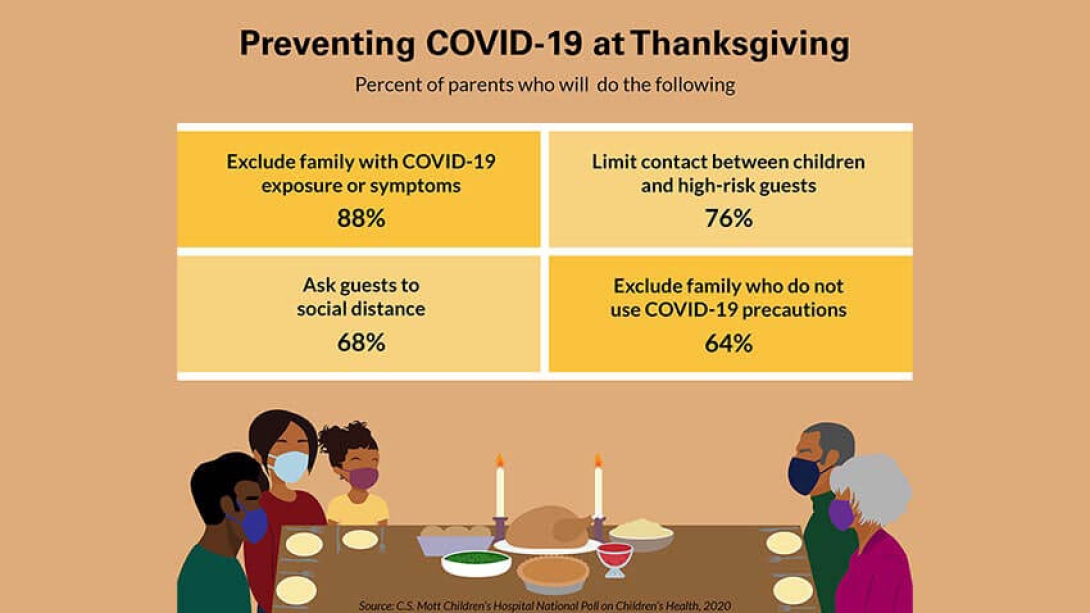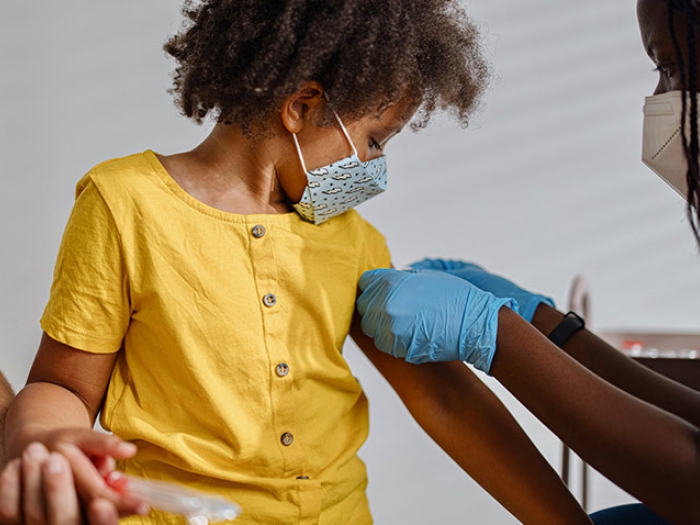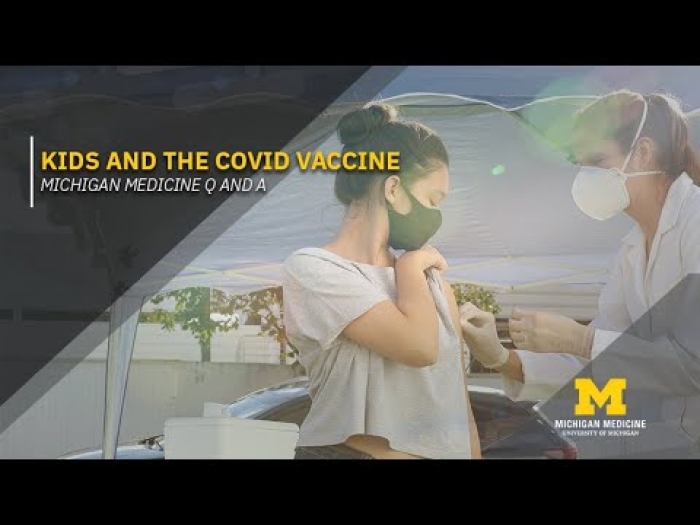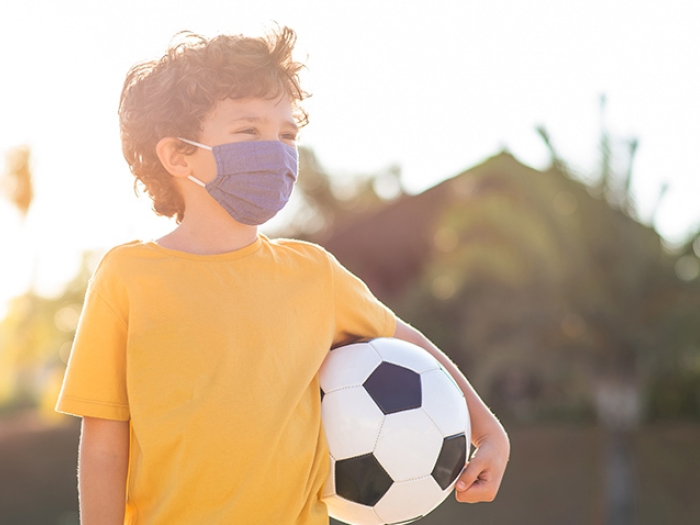National Poll: Over half of parents say it’s important for kids to see relatives during holidays, but many also want to prevent the spread of COVID-19 at family gatherings.
5:00 AM
Author |

For some families, one of the most difficult steps in reducing COVID-19 risks has been keeping children apart from grandparents and other extended family members.
And that may be especially true during the holiday season, as novel coronavirus cases rapidly accelerate across the nation and public health officials discourage gatherings to help slow the spread of the deadly virus.
Still, some parents may prioritize continuing Thanksgiving Day traditions with their children over reducing transmission risks, a new national poll suggests.
One in three parents say the benefits of gathering with family for the holidays are worth the risk of spreading or getting the virus, according to the C.S. Mott Children's Hospital National Poll on Children's Health at Michigan Medicine.
But parents are weighing competing priorities. While over half indicate it's very important that their child sees extended family and shares in family holiday traditions, three-quarters also believe it's important to prevent the spread of COVID-19 at family gatherings.
Like Podcasts? Add the Michigan Medicine News Break on iTunes or anywhere you listen to podcasts.
"As COVID-19 cases spike, many families are struggling with whether and how to continue their holiday traditions while balancing risks and benefits," says Mott Poll co-director Sarah Clark, M.P.H.
Half of parents say COVID-19 has substantially decreased the amount of time their children spend with extended family members and some may be growing weary of these separations, Clark says.
"For many parents, holidays mean sharing special rituals across different generations and opportunities for children to connect with grandparents, cousins, and other relatives," Clark says.
"Our report suggests that while many children have spent less time with relatives during the pandemic, some parents may have a hard time foregoing holiday gatherings in order to reduce COVID-19 risks."

But with children returning to face-to-face school and other activities in some communities, it may be especially risky for them to reunite with older adults who are at highest risk of getting seriously sick.
"Families may need to consider alternative, safer ways to celebrate and preserve traditions in order to keep loved ones safe," Clark says.
The nationally-representative report was based on responses from 1,443 parents of at least one child age 12 or under.
Shortening the guest list to reduce the risk of transmission
Among parents whose children usually see extended family on Thanksgiving, 61% still plan to meet in-person for the upcoming holiday. But only 18% plan to involve people traveling from out of state this season, even though 40% say gatherings usually involve people traveling that far.
Many parents who do plan to proceed with in-person celebrations say they will use different strategies to keep children and guests safe, according to the report.
LISTEN UP: Add the new Michigan Medicine News Break to your Alexa-enabled device, or subscribe to our daily updates on iTunes, Google Play and Stitcher.
Eighty-eight percent of parents say they will ask family members not to attend a Thanksgiving gathering if they have any COVID-19 symptoms or exposure. Meanwhile, two-thirds will not invite certain family members who have not been practicing safety precautions, such as mask wearing.
SEE ALSO: How to Have a Safe Holiday Season During the COVID-19 Pandemic
In assessing the safety precautions of extended families, parents need to ask about adults and children. Given the differences in local and state regulations, parents should ask whether cousins or other school-age family members are attending in-person classes and activities. If they are, there should be specific questions about how well COVID-19 precautions are consistently followed.
Parents should anticipate that some of these conversations will be uncomfortable, as there is uneven acceptance about precautions like wearing masks, Clark says.
"A key strategy to minimize the risk of COVID-19 transmission will be to limit the number of households who get together and choosing carefully who to include in Thanksgiving celebrations. Parents will also have to be vigilant about safety precautions," Clark says.
Maintaining distance at gatherings
Many parents also plan to take extra steps to protect older adults. Nine in 10 parents say Thanksgiving gatherings typically include grandparents, and three-quarters of parents will try to limit contact between their child and high-risk guests, including seniors or people with medical conditions.
Our report suggests that while many children have spent less time with relatives during the pandemic, some parents may have a hard time foregoing holiday gatherings in order to reduce COVID-19 risks.Sarah Clark, M.P.H.
Two-thirds of parents also plan to ask guests to maintain social distancing as much as possible.
However, experts caution that enforcing these rules may be a challenge.
"It may be difficult to maintain distance between children and high risk adults throughout a multi-day visit or even during a lengthy dinner," Clark says. "Parents should be realistic about how feasible it will be to limit contact and think carefully about whether to gather in person with high-risk family members."
In families that choose to see extended family or other guests, parents should also talk with children in advance about how to celebrate safely, including a reminder about masks and social distancing. They may also want to talk about proper "voice etiquette" by limiting singing or yelling, as these actions can more easily spread viruses.
MORE FROM MICHIGAN: Sign up for our weekly newsletter
It is also recommended that children engage in outdoor activities for as much of the day as possible, she says.
Parents should consider substitute traditions
Alternatively, families may consider creative ways to sustain family traditions without in-person gatherings.
"The key for parents is to focus on elements of the celebration that represent family traditions or that seem most important to children," Clark says.
Ideas may include:
-
Talking with children about their favorite Thanksgiving foods, decorations or activities, and then using that input to plan a virtual celebration that includes family members in different locations.
-
If children mention a particular memorable holiday decoration displayed by grandparents, parents can encourage them to create their own version at home.
-
If children favor a family member's pumpkin pie, parents can help children make it at home, possibly with video calls with grandparents and other family members who can coach them through the process.
-
Arranging a group call or virtual gathering at a specific time for extended family to share stories or to have a family member give a blessing before Thanksgiving dinner.
"We all know that large public gatherings carry great risks of spreading COVID-19. But small and casual social gatherings where people feel most 'safe' are also part of what has been fueling transmission," Clark says.
"With COVID-19 cases increasing in every state, it is essential that all family members do their part to prevent further spread. That may mean celebrating the holidays a little differently this year."

Explore a variety of health care news & stories by visiting the Health Lab home page for more articles.

Department of Communication at Michigan Medicine
Want top health & research news weekly? Sign up for Health Lab’s newsletters today!





